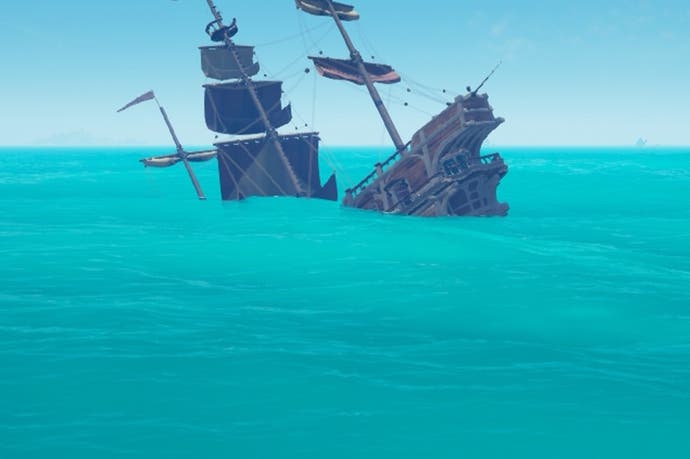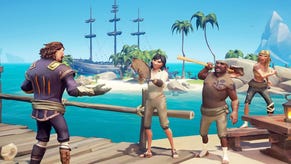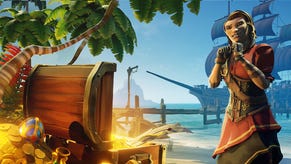Sea of Thieves is an overdue antidote to content farming
Why grind when you can steal?
Size matters on the Sea of Thieves, but when you're up to your berringed earlobes in pirate gold, cunning is king. Earlier this week myself and three other buccaneers spent an hour chasing a single, wily captain in the game's closed beta. Our target led us a merry dance, steering his nimble sloop in amongst the looming rock spires by the aptly named Shipwreck Bay, but eventually he made a break for the open sea, and with the wind behind us and our galleon's sails at full spread, we quickly closed the distance.
I remember standing on our bowsprit - the long bit that sticks out of the front of the ship, yes, I did just Google it, what am I, Francis Drake? - training my musket scope on the sloop's cabin and spying no less than five chests, brimming with the accursed wealth of the seven seas. Delicious plunder! I checked my ammunition, readying myself to leap across the gap, and our galleon promptly blew up. The other captain had dropped into the waves as we drew alongside, boarded us unnoticed and detonated a barrel of gunpowder in our hold. As he told me subsequently aboard the Ferry of the Damned, the game's eldritch respawn lobby, "I was waiting for just the right moment."
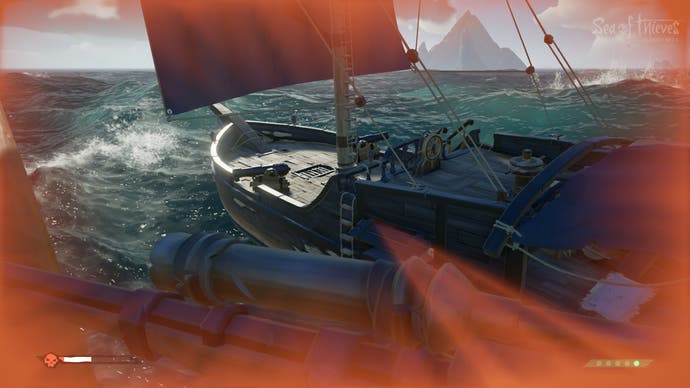
Taking other people's stuff, and to hell with any hand-wringing about "fair play": this, for me, is the real heart of Rare's lovely new game, the place where its gorgeous ocean sandbox, sunny 90s platformer ambience and persistent online elements come into focus. It's been interesting to follow the discussion around Sea of Thieves since the beta went live, a discussion that has shifted from scorn over the initial netcode wobbles to giddy tales of ramming actions and corrosive, blood-red tides on the edge of the map.
The game's biggest draw remains its simplified yet testing sailing simulation, which factors in everything from wind direction through choppy seas ruining your aim to sails blocking your pilot's view of obstacles ahead. If you're going to make headway in one of the larger, four-player vessels, especially, everybody needs to play their part: somebody to keep watch from the bow or crow's nest, somebody to drop and angle the sails, somebody to shout out compass bearings from the map table. The thrill of slicing through that heaving, glittering Unreal ocean aside, this division of labour fosters a sense of camaraderie that goes far beyond the dull arithmetic of the average co-op action game. A ship in Sea of Thieves isn't some midboss that requires your squad to muster a certain DPS total - it's a multi-faceted toy best operated by several pairs of hands, a tangible, sociable thing that reflects the long years Rare has spent incubating party game concepts for poor, doomed Kinect.
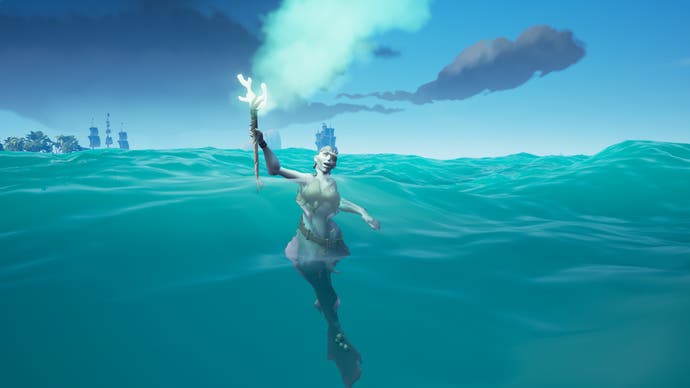
If the sailing is a delight, there have been grumbles that the game's quests ("voyages") don't have much substance to them, that as with Destiny at launch, Sea of Thieves will prove mesmerising but vacuous. It's a reasonable concern. The opening treasure hunts available from the Gold Hoarders NPC trading company are very A-to-B, though lifted by the throwback charm of having to work out where B is using a parchment map or written clues, rather than sleep-walking to a waypoint. In the full game we can expect missions to track down celebrity undead freebooters via the Order of Souls, and timed merchant runs that see you roving the islands with a shopping list of wildlife and rare commodities. The latter sound like a nice variation on treasure hunts, but given the bruising clunkiness of the on-foot combat, it's hard to get excited about PvE quests. Still, I think all this is missing the point a little, the point being that quests in Sea of Thieves aren't just there to entertain and enrich you. They are there to create prey.
Most big budget persistent online "service games" like Sea of Thieves are driven by acquisition, and acquisition in these games is broadly about grind - sinking hours into piecemeal, repetitive activities, secure in the knowledge that the more time you spend with the thing, the more "content" you'll have access to. The result can be an ephemeral kind of hourly labour, a game of moderately flavourful drudgery greased by the fleeting dopamine hits you get from lootbox-opening animations or the audio cue when an XP bar fills up. Rare's latest is on some level designed to scratch the same itch: you have a golden Reputation stat with each trading company, raised by completing voyages, and the higher your reputation, the more elaborate the voyages they'll supply. The game is also, however, set up to punish you for treating it as grind, because anything you unearth can be stolen and turned in for the same reward by any rival crew, and waylaying people who are trying to earn an honest living is, inevitably, a much more engrossing business than poking about with your shovel.
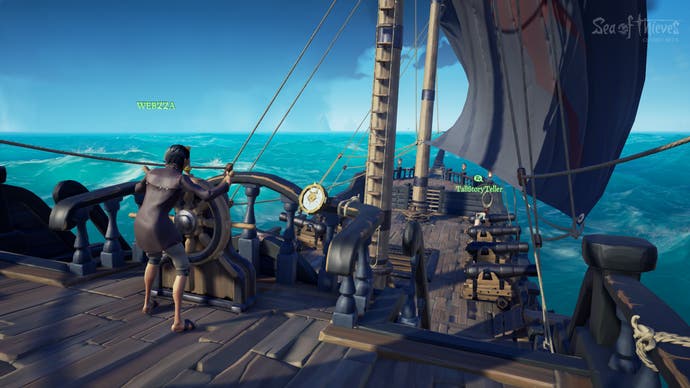
One critical design decision is that players must return to an outpost to sell off their ill-gottens. At first I thought the extra legwork would be annoying. In fact, it's a source of wonderful suspense, where the trepidation you feel as you comb the skyline for other ships is exactly proportionate to the number of chests in your cabin. Many of the Gold Hoarder voyages involve trips to several caches of loot on different islands, and there's always the temptation to visit them all in one go, but you may rue that decision when two sails appear on the horizon just as the wind turns against you. That said, it can be worth attracting attention simply for the exhilaration of getting away in one piece. At another stage in the beta, I managed to throw off an attacking crew by steering into a tempest, dousing my sloop's lanterns and doubling back as my pursuers fought the elements. I may be imagining it, but I think they were struck by lightning. How's that for emergent gameplay?
Another key design decision is that ports aren't, in fact, safe havens, though it feels like the odds of encountering other players are decreased in the vicinity. It's possible you'll spot another vessel returning to harbour as you prepare to depart, and any ship that's returning to harbour is likely a ship that's loaded with booty. It makes you wonder how high you could rise in Sea of Thieves just by loitering near outposts, either sucker-punching other ships as they approach or sneaking aboard to steal any remaining cargo while the owner is ashore. It also means you'll need to give raiders the slip before sailing into port, or in a pinch, have one of your gallant crew dive overboard with the loot as you pass by the jetty. Even at this early stage, there's the sense of a well-thumbed community playbook of piratical and anti-piratical gambits, from squirreling away chests in the crow's nest to dropping a ship's anchor as it tries to escape.
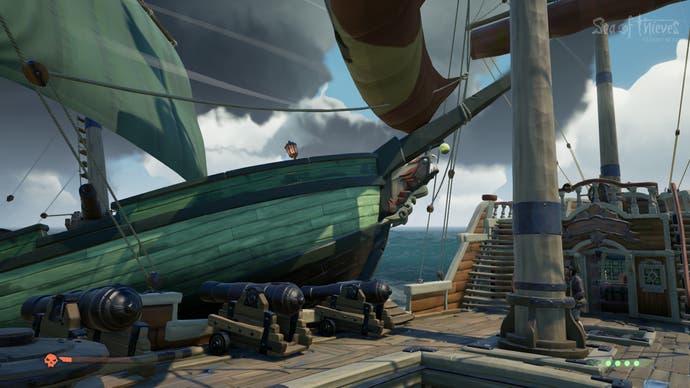
There is, of course, a thin line between creating space for such feats of skulduggery and turning your game into the multiplayer equivalent of the Bermuda Triangle, and it's important that players have something to occupy themselves with when piracy loses its appeal. If nothing else, the world's preset challenges and rewards need to be enticing enough that at least a few people take an interest, so that everybody else has somebody to hunt. For the moment, though, I'm just thrilled to play something in the game-as-service mould that puts more value on guile than stamina. Going by its beta, Sea of Thieves could be one of the year's fiercest joys - a startling original from a studio whose heyday may yet lie ahead of it, and a game of predatory improvisation rather than another ocean of content to trawl.
